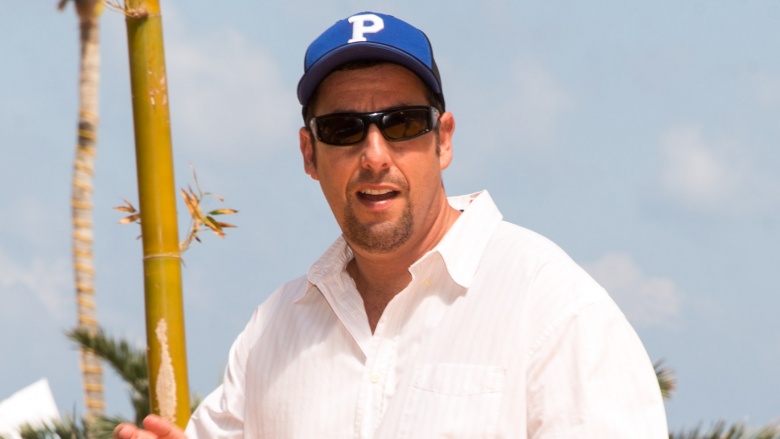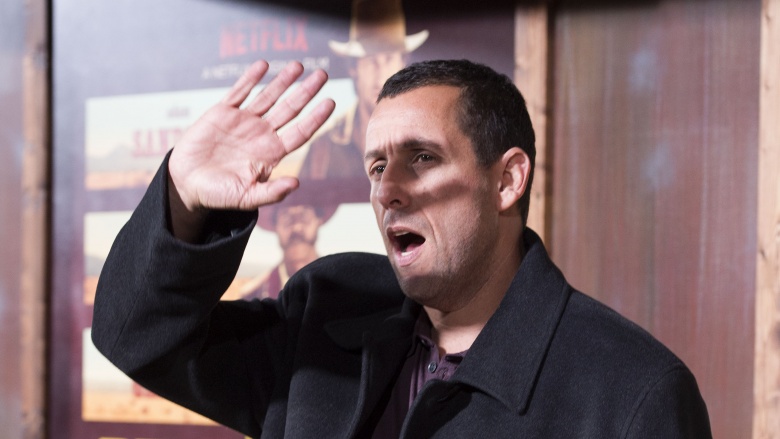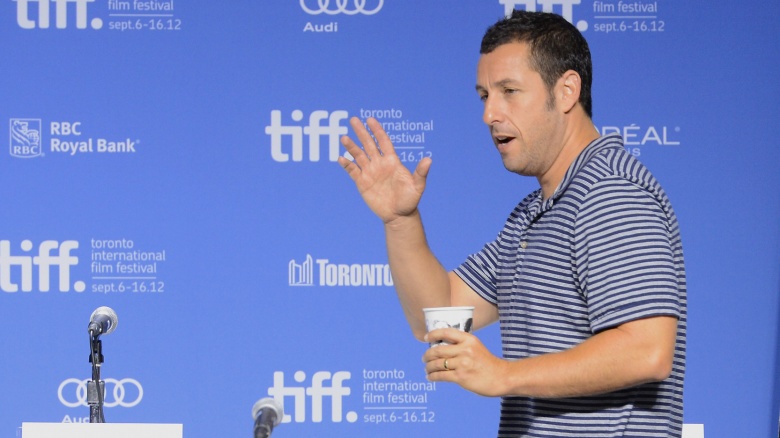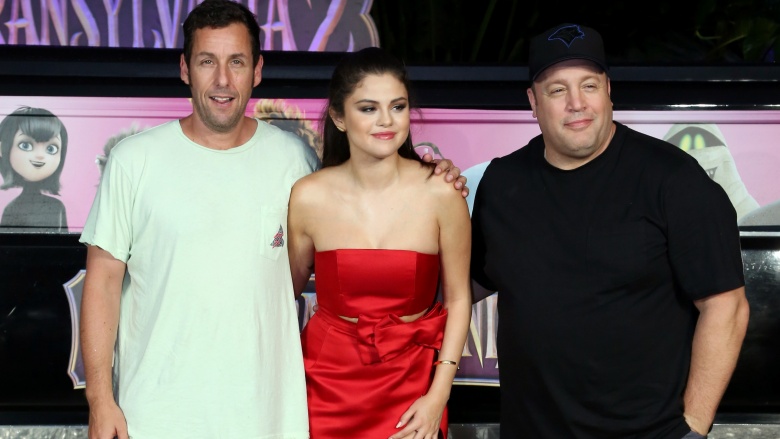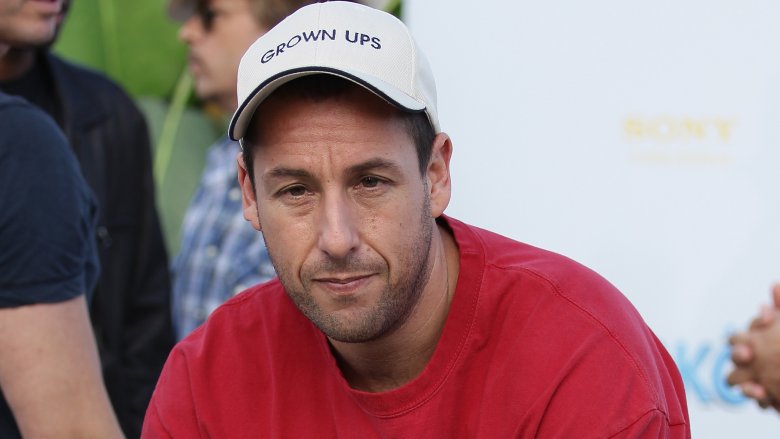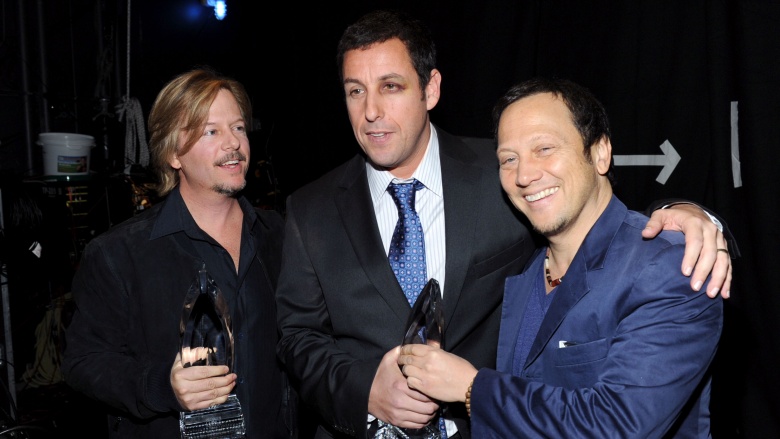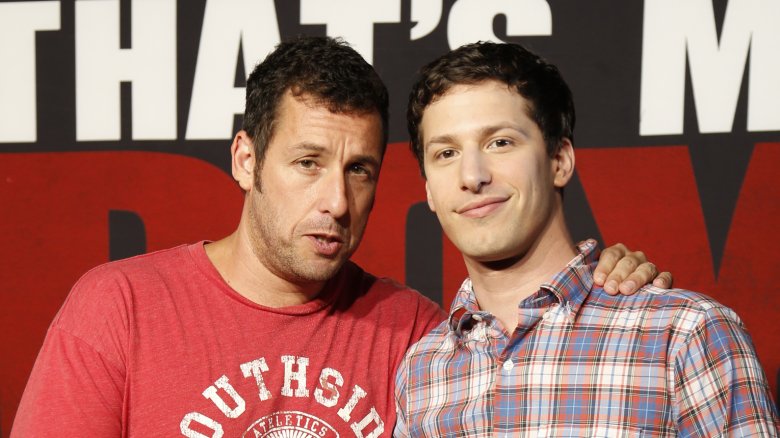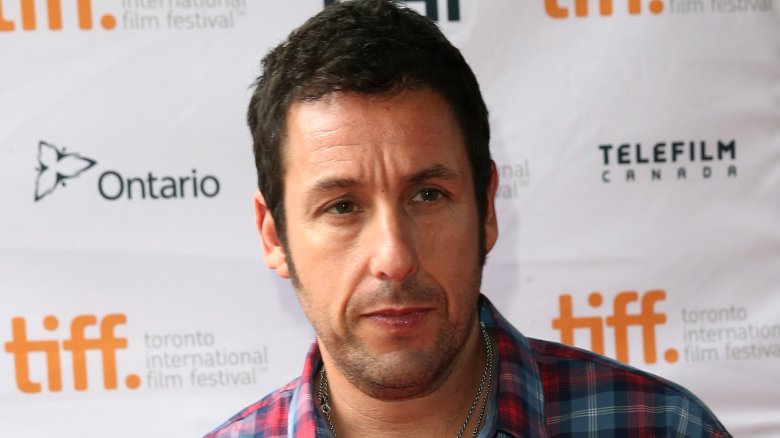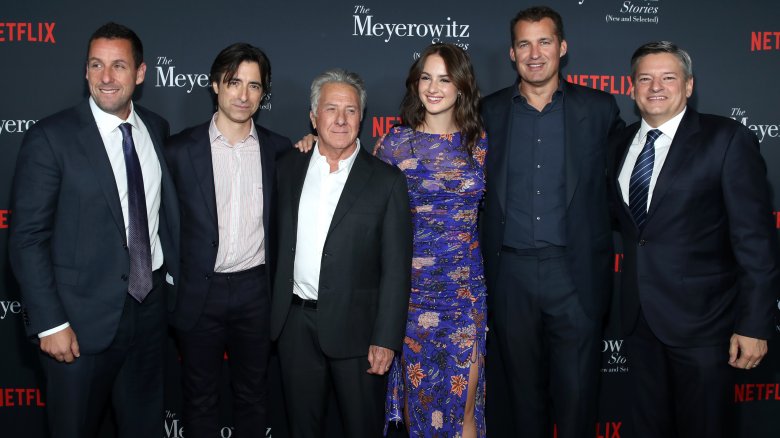The Real Reason Adam Sandler's Career Is Falling Apart
It's hard to believe that, at one point, Adam Sandler was one of the most successful comedy actors in Hollywood. After a brief but notable stint on SNL, Sandler became, for an entire generation, the quintessential lovable doofus. His post-SNL hits Billy Madison and Happy Gilmore were wild successes in the cable and home video markets. In subsequent films like Big Daddy and The Wedding Singer, he proved to be a comedic leading man who could act with heart — a talent that allowed him to show off his impressive acting chops in Paul Thomas Anderson's Punch-Drunk Love. But like everything else in this world, Hollywood is a slave to that old adage: "all good things must come to an end." Sandler's career in recent years is proof enough of that. If you take a look at any of his projects lately, Sandler has taken quite a fall from professional grace. In box office flop after box office flop, his career appears to be increasingly beyond repair.
Studios are fed up with his money-wasting antics
The Sony hack in 2014 revealed a lot of embarrassing information about the studio — and also a whole bunch of drama. The hack leaked private emails which revealed tons of back chatter between studio execs, producers, and stars, and to say the conversations got a little catty would be an understatement. The emails revealed that, on a professional and seemingly personal level, people at Sony were over Adam Sandler and his movies — and had been for awhile. Employees called out Sandler by name as a blight upon the studio.
"There is a general "blah-ness" to the films we produce," one employee wrote. "[W]e continue to be saddled with the mundane, formulaic Adam Sandler films." Plenty of stars rub people the wrong way with their egos or their attitudes, but Sandler has achieved the peculiar accomplishment of single-handedly lowering morale at work for hundreds, if not thousands of Sony employees.
Audiences hate his movies more and more
While Adam Sandler's movies have never been critically beloved, his work in the last decade has been not consistently bad and historically terrible. It's gotten to the point where the Wikipedia page for his filmography links right to the article for "list of films considered the worst" — and of the ten movies on that list for this decade, Sandler produced or starred in three.
Since 2009's Funny People, every movie he's produced or written has been certified rotten — and he didn't fare much better in the decade before that one, either. And while critics have never been big fans, it's worth noting that a number of those efforts earned some dismal audience scores too. In fact, Sandler's movies have been pleasing fewer and fewer people, increasingly notching scores in the single digits. With each film, Sandler's spent the decade disappointing just about everybody. For years, critics have speaken openly about Sandler's deteriorating career as though it's a fact, and the numbers don't lie — when it comes to the quality of his work, he's become objectively worse.
He refuses to give print interviews
Adam Sandler himself does not appear to be interested in challenging his unfavorable media portrayal. Long before his career took a sharp nosedive, the actor stopped granting interview requests. After press junkets for Billy Madison, he apparently read some unfavorable descriptions of himself and decided to stop talking to print journalists altogether. This was a bold move at the time, and it's certainly a risk today, during an era in which social media and the blogosphere make film publicity a highly competitive game. Sandler's Twitter feed, perhaps his best means of reaching fans, is hardly engaging. He rarely tweets, and when he does, it's generally to promote his own work.
He has a bad reputation with women
In the post-Beyoncéworld, overt sexism is becoming increasingly less tolerated in the entertainment industry, and recently, Adam Sandler has earned a few feminist wrist slaps. In June of 2016, actress Rose McGowan tweeted out a casting notice she'd received for one of Sandler's movies that encouraged women auditioning to wear "form-fitting tanks that show off cleavage (push-up bras encouraged)." Soon after calling out Sandler on Twitter, McGowan said she was fired by her agent, and a social media outcry erupted.
The Daily Dot published a tongue-in-cheek piece entitled "How to Be a Girl in an Adam Sandler Movie" that accused Sandler of writing female characters who were "All but a literal object." At a premiere for Sandler flop Hotel Transylvania 2, he and co-star Kevin James, both in what appeared to be gym clothes, were photographed next to a very dressed-up Selena Gomez, prompting an internet controversy over the double standards for men and women. Sandler may have played a girl in Jack and Jill, but he doesn't seem to relate well with them.
He's lazy and we know it
The overriding impression for many former fans of Adam Sandler is that the comedian has grown lazy. His performances in movies he's produced this decade have been described as tired and "checked out," lacking energy and giving the impression he's just going through the motions. And when he turns in a once-a-decade great performance in movies like The Meyerowitz Stories or Punch-Drunk Love, it makes his current low effort output all the more obvious. Sandler made his apathy about filmmaking abundantly clear when seemingly confirmed that he only makes films in locations where he wants to take a vacation. Uh, nice?
With his background as a king of '90s comedy, Sandler phoning it in is just not the kind of thing an audience can ignore. Sandler used to feel like a charismatic sweetheart and an unhinged live wire, a delight to watch. Now he's a t-shirt and cargo shorts schlub, always turning up with the same old cast of hangers-on and just going through the motions.
His co-stars are even more stale than he is
Comedy posses are no new phenomena, especially among SNL alumni, but Adam Sandler's insistence on working time and time again with actors like David Spade, Kevin James, and Rob Schneider may be preventing him from reaching younger fans. He did hire Natasha Leggero for his recent Netflix release The Do-Over, but relegated her to a supporting "crazy wife" role, leaving the more substantial acting to David Spade. In the case of The Do-Over, this resulted in yet another slew of disastrous reviews, with one critic declaring Sandler a "restless innovator (who) is still finding new methods of making bad movies."
Spend more, get less
As revealed in the 2014 hack, Sony executives were openly fed up with Sandler for his budget demands and the exorbitant costs of his movies. In one leaked exchange, it was revealed that Sandler tried to convince executives to cough up $200 million for a Candy Land project, which is comparable to the budget of a Star Wars or an X-Men flick. Another time, Sandler tried to squeeze an extra $100,00 out of the studio as a fee for his producing partner — after they'd already paid out their maximum executive producer fee of $500,000. As a result, Sony executives vented their frustrations with Sandler in personal terms. "Adam is an asshile [sic] and this is more his fault than anyone's," wrote exec Amy Pascal after the dead end Candy Land pitch meeting.
"He isn't the guy he once was," added Doug Belgrad, president of Sony's motion-picture group. "And nobody can make that better for him."
The corporate grift
Product placement is rarely the worst thing in the world — movies have to get financed somehow — but Adam Sandler's pushed the practice to a ridiculous degree. Jack and Jill from 2011 was full of scenes that are essentially commercials, with the movie's plot centering around a Dunkin' Donuts ad campaign that the Washington Post called "the most prominent product placement of all time." That movie also gave extensive attention to the Royal Caribbean Cruise Line, stopping the movie for a glossy corporate showcase, all on top of more spots for Coca-Cola, Pepto-Bismol, Match.com — you name it.
Even worse, despite the big money product placement Sandler's movies have increasingly looked cheap and thrown together, even with budgets frequently in the high eight digits. Jack and Jill reportedly cost $79 million to make, but it looks like the sort of thing you'd see on Saturday Night Live — or worse. When none of the money makes it to the screen, the whole operation starts to feel like one big grift.
He's shackled himself to Netflix
In 2014, Adam Sandler made an arrangement with Netflix that's proven to be his best career move of the decade: he signed a four-movie deal with the streaming service, producing The Ridiculous 6, The Do-Over, and Sandy Wexler in short order. All three of these movies were critically savaged, but according to Netflix, they get tons of eyeballs. And why not? People were going to theaters to see Sandler in 2015's Pixels, but in fewer and fewer numbers. There could've come a time when those last loyalists just stayed home, but now that Sandler's decamped to Netflix, we'll probably never know.
Since then, it's become clear Sandler has hitched his wagon to the streaming giant. Now he's in a position of providing unchallenging, lowest-common-denominator content to people who don't even have to leave their couches to watch it. With Netflix, he's bomb-proof, to the point where one wonders if he'll ever return to work in the studio system. Probably not, though: in 2017, Sandler and Netflix re-upped for four more.
